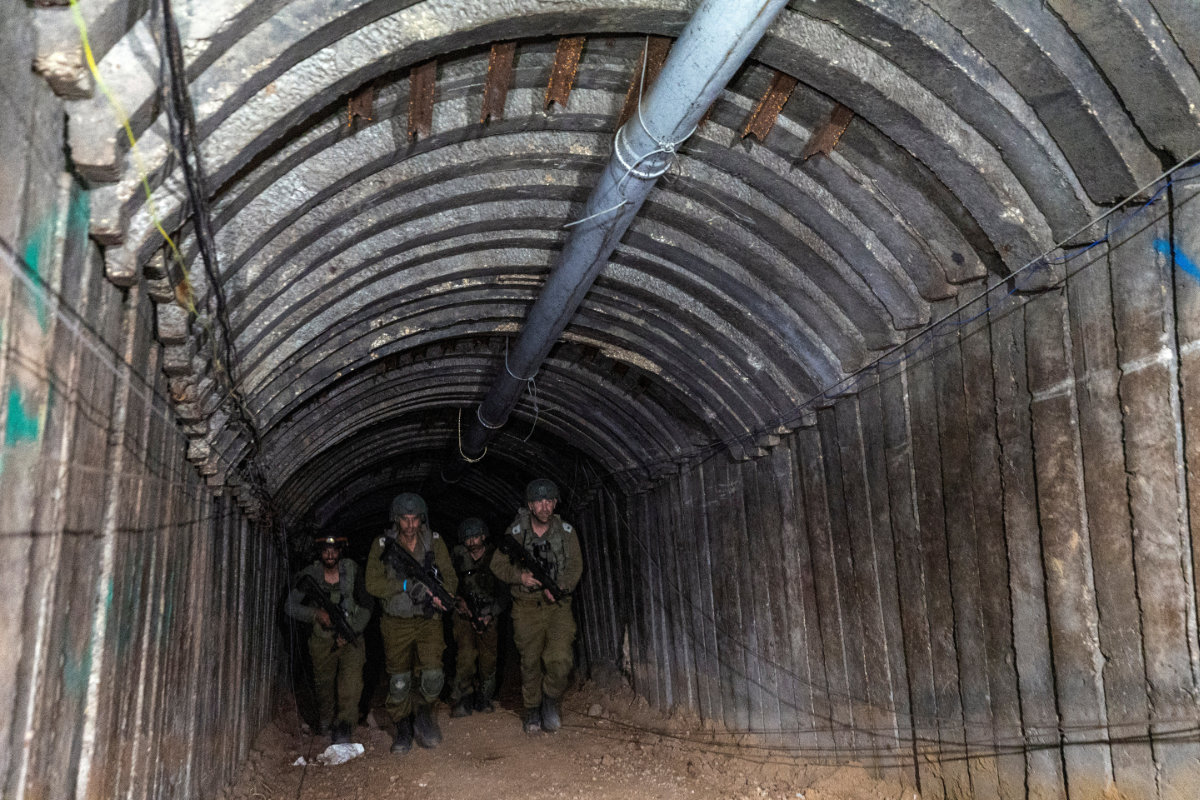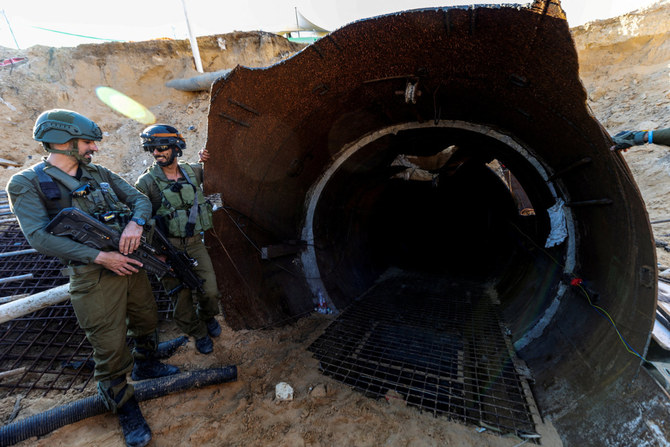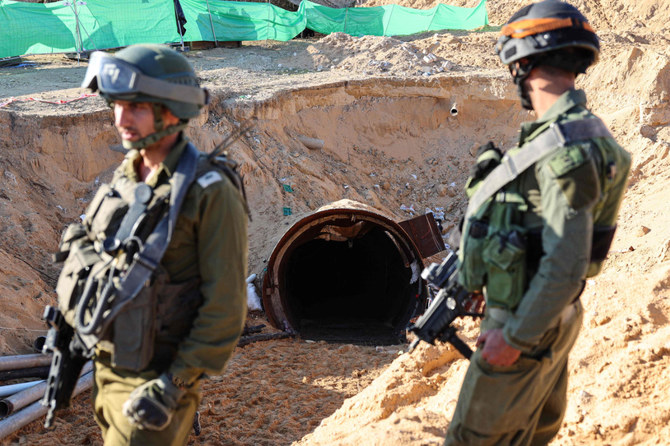GAZA STRIP, Palestinian Territories: Israel’s army said Sunday it had found a vast Hamas tunnel as it pressed its offensive in Gaza despite growing international calls for a ceasefire and pleas from relatives to bring home the remaining hostages.
Israel’s army said it had uncovered the biggest Hamas tunnel so far near the border crossing at Erez — large enough for small vehicles to use, an AFP photographer reported.
Israel said the tunnel cost millions of dollars and took years to construct, featuring rails, electricity, drainage and a communications network.
The Gaza war started when Hamas militants burst through Gaza’s high-security border fence on October 7 and carried out the worst-ever attack on Israel, killing 1,139 people, mostly civilians, and abducting around 250, according to updated Israeli figures.
The Israeli army says 121 soldiers have died in the ground operations that began late in October to accompany relentless aerial and artillery bombardment.

Israeli soldiers operate on December 15, 2023, in an iron-girded tunnel designed by Hamas to disgorge carloads of Palestinian fighters for a surprise storming of the border. (Reuters)
The bloodiest ever Gaza war has devastated much of the Palestinian territory, sparking global concern.
Dozens more were killed in Israeli strikes on Sunday, said the health ministry in the Hamas-run territory where authorities report more than 18,800 people, mostly women and children, have been killed.
Most of Gaza’s population has been displaced as homes are bombed and they struggle to find fuel, food, water and medicine.
Israeli Prime Minister Benjamin Netanyahu again vowed: “We will fight until the end. We will achieve all of our aims” — eliminating Hamas, freeing all hostages and ensuring that Gaza will not again become “a center for terrorism.”
But French Foreign Minister Catherine Colonna, visiting Tel Aviv, was the latest envoy to call for an “immediate and durable” truce.
“Too many civilians are being killed,” she said.
France also condemned an Israel bombardment that caused the death of one of its foreign ministry officials who had taken refuge in Rafah, southern Gaza.
Colonna’s British and German counterparts, David Cameron and Annalena Baerbock, also said too many civilians had been killed. But it was not, they said, the right time to call for “a general and immediate ceasefire, hoping it somehow becomes permanent.”
That, they wrote in Britain’s Sunday Times, would ignore the threat Israel faces from Hamas.
Pope Francis deplored the death of a Christian mother and daughter who, according to the Latin Patriarchate of Jerusalem, were shot dead by an Israeli soldier at Gaza’s only Catholic church, where families were sheltering.
“This happened even inside the parish of the Holy Family where there are no terrorists, but families, children, sick or disabled people,” the pope said.
The United Nations estimates that 1.9 million Gazans — around 80 percent — have been displaced by the war.
“I would not be surprised if people start dying of hunger, or a combination of hunger, disease, weak immunity,” said Philippe Lazzarini, head of the United Nations agency for Palestinian refugees, UNRWA.
They have also faced repeated communications outages but on Sunday Gaza’s main telecoms firm said mobile and Internet service had been gradually restored after field teams fixed “the main damaged site.”
In what was once the courtyard of Kamal Adwan hospital in northern Gaza, Palestinians waded through the rubble, searching for corpses.
The Hamas health ministry had reported on Tuesday that Israeli troops stormed the hospital during a days-long “siege.” Israel’s army said Hamas had used the facility as a command center. It has made similar accusations about other hospitals, claims Hamas had denied.
Outside the hospital courtyard, which showed tank and bulldozer tracks, Abu Mohammed, who came to look for his son, stood crying.
“I don’t know how I will find him,” he said, pointing to the debris.
The Israeli government has come under growing pressure, including from its top ally the United States, but also from families of hostages, to either slow, suspend or end the military campaign.
Washington provides Israel with billions of dollars in military aid.
There are 129 hostages still in Gaza, Israel says, and relatives again rallied in Tel Aviv on Saturday to call for a deal to bring them home after the army admitted to mistakenly killing three of the captives in the territory.
On Sunday weeping relatives of one of the three men, Alon Shamriz, 26, wept and clung to each on grief at his burial near Tel Aviv.
At the funeral, Shamriz’s brother said the government “abandoned” and “murdered you.”
Israel’s military has said the soldiers had violated rules of engagement.
Netanyahu said the killing of the three “broke the whole nation’s heart” but that military pressure was necessary to bring back the other captives and win the war.
One hostage already freed, German-Israeli Raz Ben-Ami, 57, spoke of the “daily humiliation, mental, physical,” she endured, including one meal a day and no proper toilets.
Qatar, which helped mediate a truce last month that saw 80 Israeli hostages exchanged for 240 jailed Palestinians, said there were “ongoing diplomatic efforts to renew the humanitarian pause.”
But Hamas said on Telegram it was “against any negotiations for the exchange of prisoners until the aggression against our people ceases completely.”
The Gaza war has also seen violence spiral in the Israeli-occupied West Bank.
Israeli forces killed five Palestinians Sunday morning at a West Bank refugee camp, according to the Palestinian health ministry. Israel’s army said air strikes had targeted militants who had endangered soldiers.
More than 290 Palestinians have been killed by Israeli forces or settlers in the West Bank since the war erupted, health officials say.
The war has also raised fears of a broader Middle East conflict.
Israeli forces and Iran-backed Hezbollah militants are exchanging regular fire across Israel’s northern border with Lebanon.
Yemen’s Iran-backed Houthi rebels, saying they want to pressure Israel, have launched attacks on passing vessels in the vital Red Sea shipping zone, forcing major companies to redirect vessels.
Israeli air strikes against targets near Damascus on Sunday wounded two Syrian soldiers, the Syrian defense ministry said.
Israel primarily targets Iran-backed forces and Hezbollah fighters, as well as Syrian army positions in the country, and has stepped up such attacks since October 7.



























